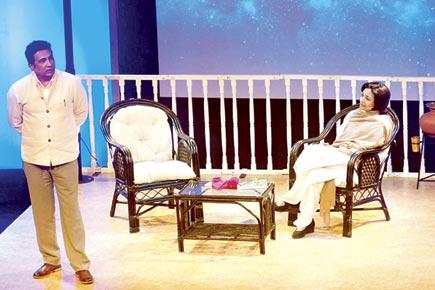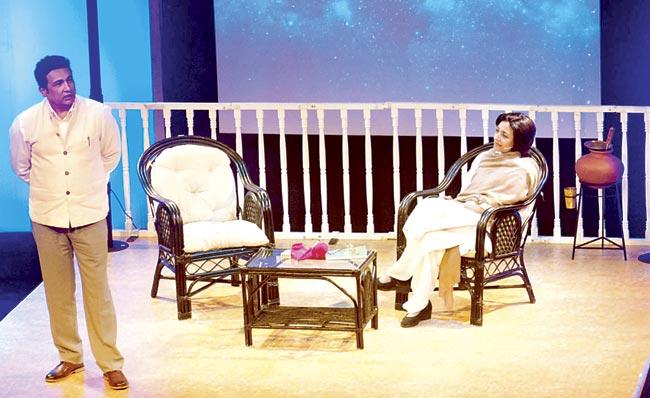The Amrita Pritam-Sahir Ludhianvi love story continues to fascinate people, in spite of the passage of time

 The Amrita Pritam-Sahir Ludhianvi love story continues to fascinate people, in spite of the passage of time. It has come to acquire its own mythology, because a romance between two great minds is such a magical idea, that truth need not come in the way of those who want to believe.
The Amrita Pritam-Sahir Ludhianvi love story continues to fascinate people, in spite of the passage of time. It has come to acquire its own mythology, because a romance between two great minds is such a magical idea, that truth need not come in the way of those who want to believe.
A film, reportedly starring Priyanka Chopra and Irrfan Khan is under production, and a new stage production, Ek Mulaqat, with Deepti Naval and Shekhar Suman has just opened to full houses and standing ovations.
ADVERTISEMENT

The play Ek Mulaqat based on the Amrita Pritam-Sahir Ludhianvi love story, starring Deepti Naval and Shekhar Suman, has just opened to full houses and standing ovations. Pic/Narendra Dangiya/NCPA
Today, comedies and musicals are popular, but there is still an audience, particularly the over-40 generation, hungry for plays that can draw them in with the beauty of language (when was the last time an audience was addressed as “Khawateenon hazraat”) and performances that are heartfelt. Many who went to see the play, and more that clamoured for tickets, were perhaps attracted by the celebrity status of the two actors - Deepti Naval stepped on stage for the first time —but they responded to the poetry, the emotions and perhaps, memories evoked by words written by the two great poets. In this frenetic age, there is also something poignant about an unhurried, unrequited romance that unfolded through words put down on paper, which spilled over from intensely personal letters into beautiful poetry.
Then, there was the aura surrounding them — when it was not common for women to walk out of unhappy marriages, Amrita Pritam caused a scandal by leaving her husband. Her writing was already creating a stir in Punjabi literature — talent, fame and beauty were a deadly combination. In the play, among the reminiscences dotting the text, is one in which Amrita is invited to travel somewhere as part of a delegation, and the wives of the other writers in the group object to her presence. That makes her resolve never to go anywhere with other people.
She met Sahir Ludhianvi at a mushaira and was smitten — from all accounts, much more than he was. She made that love for Sahir the focus of her existence, even when the devoted Imroz came into her life and stayed with her till her death in 2005. (In the play, he is just a disembodied voice, speaking to her through a locked door.) Imroz’s love for her must have been too great, or too pure, for him to endure her tracing Sahir’s name on his back with her finger, as she sat behind him on his scooter. Sahir was not all that obsessed by her, as his many real and gossiped about affairs proved.
She has written in her autobiography, Rasidi Ticket, and the story has been often repeated, about how she used to smoke Sahir’s cigarette stubs after he had left their meeting place, to feel the imprint of his lips on her own. What is known now is a bit one-sided, since Sahir never wrote his autobiography; a lot of it is rumour and hearsay. Both belonged to the period before an inquisitive and intrusive media gnawed at any semblance of privacy.
After Partition, that inspired Amrita’s best known poem, Aaj aakhan Waris Shah nu (Today, I say to Waris Shah), Sahir moved to Mumbai (then Bombay) and went on to build a career as a renowned lyricist; Amrita and her husband moved to Delhi. That distance could never be bridged, except through tender letters and poems obviously written for each other. There were rare moments of intimacy, one is picked for the play from her autobiography, in which she recalls the time when she sat at Sahir’s bedside when he was unwell and rubbed Vicks on his chest, wishing that the moment would never end.
She was with Sahir when he passed away in 1980 — though the play takes the liberty of altering that fact. In the play, their meeting on a cold winter’s day on her terrace is strange, and their conversation is an unraveling of random memories, which is just an excuse for the recitation of their sensitive and vivid poetry. (The use of video projection in the play is clumsy and unnecessary.) There are little nuggets of humour, like when Sahir hears a drunk on the street sing one of his songs and is inordinately pleased, only to have his pride punctured a moment later, when he switches to a popular number.
The play still appeals because it is such a joy to hear the poetry, and both the actors are not just comfortable in the roles they play, but also recite with the right emotions, evoking wah-wahs from an impressed audience, and even drawing tears at a couple of scenes. For an actor, getting this kind of response must be a high.
One can only imagine if a skilled playwright (say Javed Siddiqi) had worked on the script, there was potential for a great play here, the capturing of an era and the inexplicable connection between two complex personalities.
Deepa Gahlot is an award-winning film and theatre critic and an arts administrator. You can follow her on twitter @deepagahlot
 Subscribe today by clicking the link and stay updated with the latest news!" Click here!
Subscribe today by clicking the link and stay updated with the latest news!" Click here!







